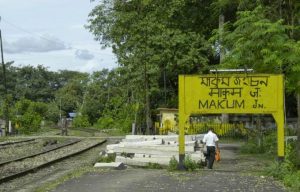Rita Chowdhury’s compelling historical novel, Chinatown Days, is about a community that was founded by a handful of Chinese workers who came to Assam in the 1830s at the behest of the British East India Company, which was then attempting to establish a tea industry in India in order to reduce its dependence on Chinese tea. The descendants of those early migrants became a thriving and prosperous part of the ethnic mosaic of Assam. Its members spoke fluent Assamese and developed deep roots in the soil of the region. After 1947, they regarded themselves as citizens of independent India. But then came the India-China War of 1962 which stirred up a maelstrom of anti-Chinese prejudice. Chinese-Indians were arrested en masse and sent away to internment camps in distant parts of the country. Their links with their former neighbours were forever sundered and they were set cruelly adrift in the world.
Chinatown Days tells this shocking story by following the life-histories of a few characters. Rita Chowdhury is an energetic and empathetic story-teller; her novel is a moving saga about a terrible injustice wrought upon a group of blameless people.
Originally published in Assamese, in 2010, under the title Makam (taken from the name of the principal Chinese settlement in the region) the novel was hugely successful: it was re-printed ten times in its first year of publication. The English translation, which appears to be the work of the author herself, is thoroughly readable: the simplicity of its diction is a perfect match for the directness of the story.
Soon to be published by Pan Macmillan India, Chinatown Days deserves to find a wide audience, not only because of its many merits as a novel, but also because it tells a story that ought to be better known.
Jangam (‘The Movement’) is a translation of the late Assamese writer Debendranath Acharya’s novel about the exodus of Indians from Burma during the Second World War. Jangam won a Sahitya Akademi Award in 1982, and to the best of my knowledge it is the only Indian novel devoted entirely to this sadly-neglected episode in modern Indian history. As such it is a historical document of inestimable value.
The novel has been translated by Amit R. Baishya, who is an Assistant Professor in the Department of English at the University of Oklahoma. In his introduction, Amit Baishya writes: ‘I learnt that the author composed the novel from childhood recollections of conversations with returning soldiers and the personal research he conducted, especially at the British Library when he attended a school for engineering in the UK. Given the relative paucity of accounts by Indian survivors, Acharya’s views on the exodus may have been coloured by the material he had access to.’
Unfortunately the novel is marred by prejudiced and stereotypical depictions of Burmese characters. Nor is the text always well-served by the translation, which is riddled with infelicities and simple errors (for example, the name of the town Myitkyina is rendered throughout as ‘Misina’; Hoolock gibbons are referred to as ‘Hooluk monkeys’ etc.).
Nonetheless, Jangam is an invaluable addition to the existing literature on the exodus from Burma and the book’s translator and publishers (Vitasta, New Delhi) deserve our thanks for making it available to the public.
I am told that The Glass Palace served as an inspiration to both Amit Baishya and Rita Chowdhury: this is, of course, deeply gratifying to know.


In case you haven’t come across it, ‘New Songs of the Survivors: The Exodus of Indians from Burma’ by Yvonne Vaz Ezdani is another good book (non-fiction) on the Indian exodus during WWII from Burma.
Appreciate your blog content regarding language services, we as a Translation company in New Delhi India also offer some of the translation services.We as a Translation company for Assamese, Mizo and Manipuri translation provider will help you to get your desired solution. To know more: http://transoplanet.com
Could you please suggest me any Assamese novel or short stories with characters with intellectual disability